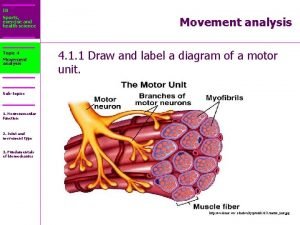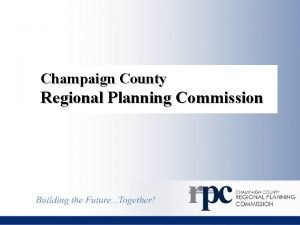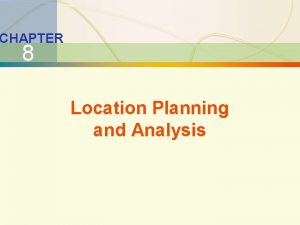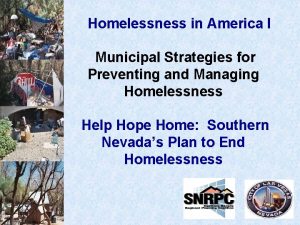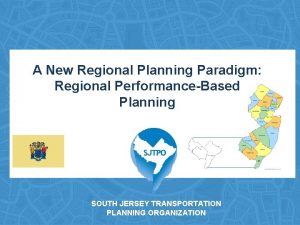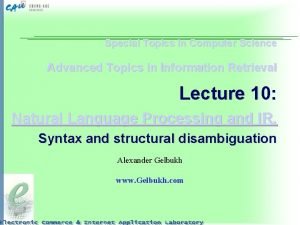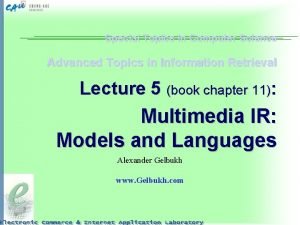REGIONAL PLANNING TOPICS I II IV Regional science















- Slides: 15

REGIONAL PLANNING

TOPICS I. • • II. IV. Regional science paradigms The physics The biological Focus of regional planning Regional planning revisited Conclusions

REGIONAL PLANNING PARADIGMS THE PHYSICS • Regional science shape its practice in the mirror image of physics (social physics) • Regional science focused on the discovery of laws of human settlements (similarities & regularities) • The methods and concept used by regional scientist are derived in great part from physics (gravity law, friction, mass, distance, energy, force, etc. ) • Function and flows taking place in human settlements are important concepts used by regional scientists • Focus on explaining human settlements form (central place theory, urban hierarchy, etc. ) • Emphasizes functional differentiation (comparative advantage)

REGIONAL PLANNING PARADIGMS THE BIOLOGICAL • Regions are analogous to living organisms • Explaining adaptation and survival of people are key issues of regional science (social Darwinism) • Instead of assuming behavior (rational) studies behavior (the purpose of the action)

FOCUS OF REGIONAL PLANNING • Decentralization policies (urban primacy vs. rank size rule) • Reduction of regional disparities (growth poles) • Redistribution (regional convergence) • Alonso argues that large cities or concentration have been proven to be inefficient. They continue to attract investment, people, etc.

Regional Planning Revisited According Barnes & Ledebur the field of regional economics has gone through a paradigm shift • Nationalist view (old paradigm) • Common market of local economies (new paradigm) The new paradigm focuses not only on economics but also incorporates politics (political economy of regions)

THE NATIONALIST VIEW • Its roots are based on the political notion of the “nation-state” • The economy is thought to be a “national” economy • The role of macroeconomic policy is to “manage” the national economy (monetary & fiscal policy) to promote growth • Regions often are defined through political jurisdictions (federal, state, local, regional) • There exists a mismatch between political units and economic regions

Common market of local economies • The US economy is a common market of local economies • Local economies are interrelated nationally as well as a globally • Linkages and functional relationships are not constrained by jurisdictional boundaries • The fact that linkages spill across political jurisdictions makes affects the efficiency and effectiveness of economic policy • Multiple stakeholders and jurisdictions converge in a single local economy. It poses the dilemma of the commons. The regional economy is a collective good

INTERDEPENDENT ECONOMIC SYSTEMS REGIONAL POLITICAL ECONOMY NATIONAL POLITICAL ECONOMY GLOBAL POLITICAL ECONOMY Source: Barnes & Ledebur (1998: 80)

A SCHEMATIC VIEW OF REGIONS Source: Barnes & Ledebur (1998: 116)

El PASO DEL NORTE REGION

EURO-REGIONS • The Association of European Border Regions sets the following criteria for the identification of euroregions http: //www. coe. int/T/E/Legal_Affairs/Local_and_regional _Democracy/Transfrontier_cooperation/Euroregions/2 Definition. asp: • An association of local and regional authorities on either side of the national border, sometimes with a parliamentary assembly; • A transfrontier association with a permanent secretariat and a technical and administrative team with own resources; • Of private law nature, based on non-profit-making associations or foundations on either side of the border in accordance with the respective national law in force; • Of public law nature, based on inter-state agreements, dealing among other things, with the participation of territorial authorities.

EURO-REGIONS Aims • The Council of Europe's policy on the promotion of transfrontier co-operation is based on: • confidence-building to increase tolerance, understanding and good-neighbourly relations between populations, especially in border regions where minorities exist (transfrontier co-operation in cultural and linguistic spheres and local and regional media are important factors in this regard) • improving the efficiency and effectiveness of the provision of public services through the sharing of facilities and services across frontiers • dealing with problems that spill over the frontiers: air and water pollution, natural and other disasters, such as floods and fire;

EURO-REGIONS • co-ordination of policies for mutual interest, such as in the field of regional planning, urban and rural development • dealing with specific needs of border populations, such as the question of taxation and social security rights of transfrontier workers, arrangements for facilitating local border traffic • establishing transfrontier co-operation bodies to ensure that transfrontier relations are sustained and improved. • The Council of Europe is working with the Assembly of European Regions (www. are-regions-europe. org), on collecting and disseminating good-practice examples in interterritorial co-operation.

http: //www. are-regions-europe. org/VICARDS/index. html
 My favorite subjects
My favorite subjects Primary science syllabus
Primary science syllabus Soil science simplified
Soil science simplified Science topics for presentation
Science topics for presentation Ib sehs topic 4
Ib sehs topic 4 Ib sports exercise and health science
Ib sports exercise and health science Advanced topics in computer science
Advanced topics in computer science Types of regions
Types of regions Brookens center urbana il
Brookens center urbana il Regional factors for location planning
Regional factors for location planning Southern nevada regional planning coalition
Southern nevada regional planning coalition State bird of washington
State bird of washington Scienteer
Scienteer Strategic planning vs tactical planning
Strategic planning vs tactical planning Planning balance sheet in urban planning
Planning balance sheet in urban planning Role segmentation workforce planning
Role segmentation workforce planning




